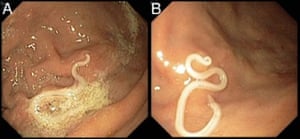From nigiri to temaki, sushi has boomed in popularity in the west, but now doctors are warning of a less appetising trend: a rise in parasitic infections.
A team of doctors from Portugal raised concerns after a 32-year old man was admitted to hospital complaining of pain in his abdomen just below his ribs, vomiting and had a slight fever, all of which had lasted for a week.
An endoscopy soon revealed the culprit: the larvae of a type of parasitic worm from the genus Anisakis. The doctors note that the condition, known as anisakiasis, is caused by eating undercooked or raw fish or seafood that has been contaminated: indeed, questioning of the patient revealed that he had recently eaten sushi.
After the larva was removed the man rapidly recovered, say the medics.

Writing in the journal BMJ Case reports, the team warn that with sushi in vogue in the west, awareness of anisakiasis is growing.
“Most of the cases were described in Japan due to food habits; however, it has been increasingly recognised in western countries,” the authors write, pointing to a Spanish study that reported 25 cases of the condition over a three year period from 1999 to 2002, with all patients having eating raw anchovies, as well as Italian research which flagged both anchovies and sushi as routes by which individuals could become infected.
The Italian study added that medical professionals should suspect the condition should patients complain of severe abdominal pain after eating raw fish, pointing out that “no effective pharmacological treatment is able to kill the larvae once eaten”.
Indeed, as the US Center for Disease Control and Prevention notes, “The treatment for anisakiasis may require removal of the worm from the body by endoscopy or surgery.”
The authors of the latest report add that besides the symptoms shown in the Portuguese case, the condition can also trigger a host of other symptoms including severe allergic reaction, as well as complications such as digestive bleeding, bowel obstruction and peritonitis.
The Food Standards Agency noted that raw fish occasionally contain parasitic larvae, but said that under European food hygiene legislation fish that is to be eaten raw should be frozen before it is sold to consumers to ensure any parasites have been killed.
The FSA added that fish and meat should always be cooked properly according to the producer’s instructions, but offered a few tips to those planning to make their own sushi.
“If you do choose to make your own sushi from fish at home, ensure you follow a reputable recipe,” the FSA advised. “If wild fish are to be eaten raw or lightly cooked, ensure that all parts, especially the thickest part, have been frozen for at least four days in a domestic freezer at -15C or colder. This will ensure that any undetected Anisakis larvae are killed.”
Popularity of sushi has brought rise in parasitic infections, warn doctors
Hiç yorum yok:
Yorum Gönder